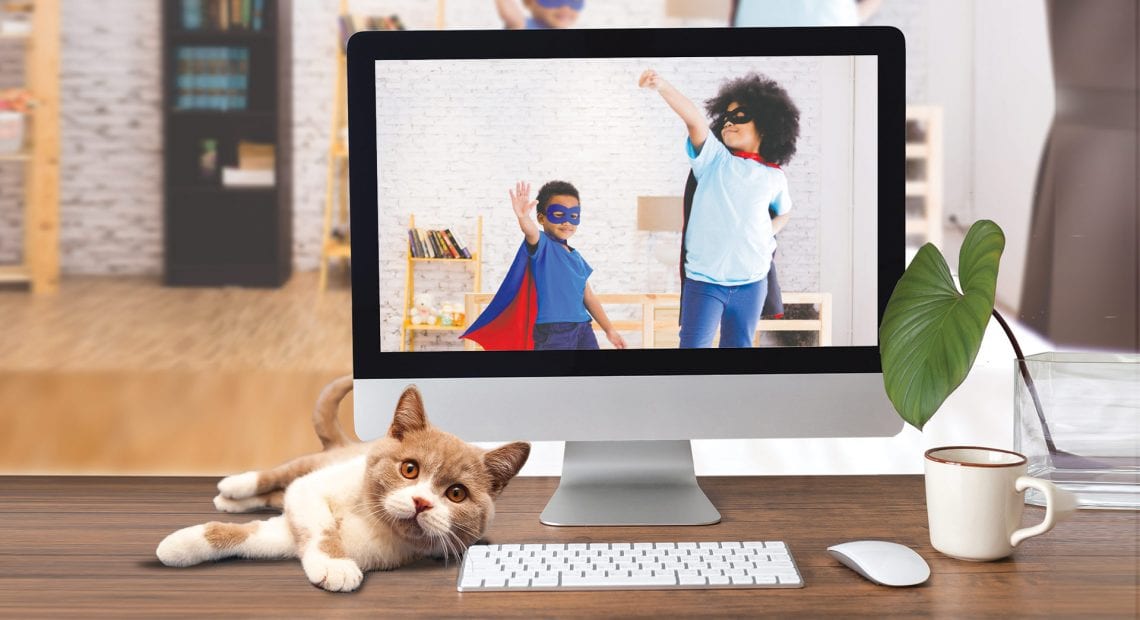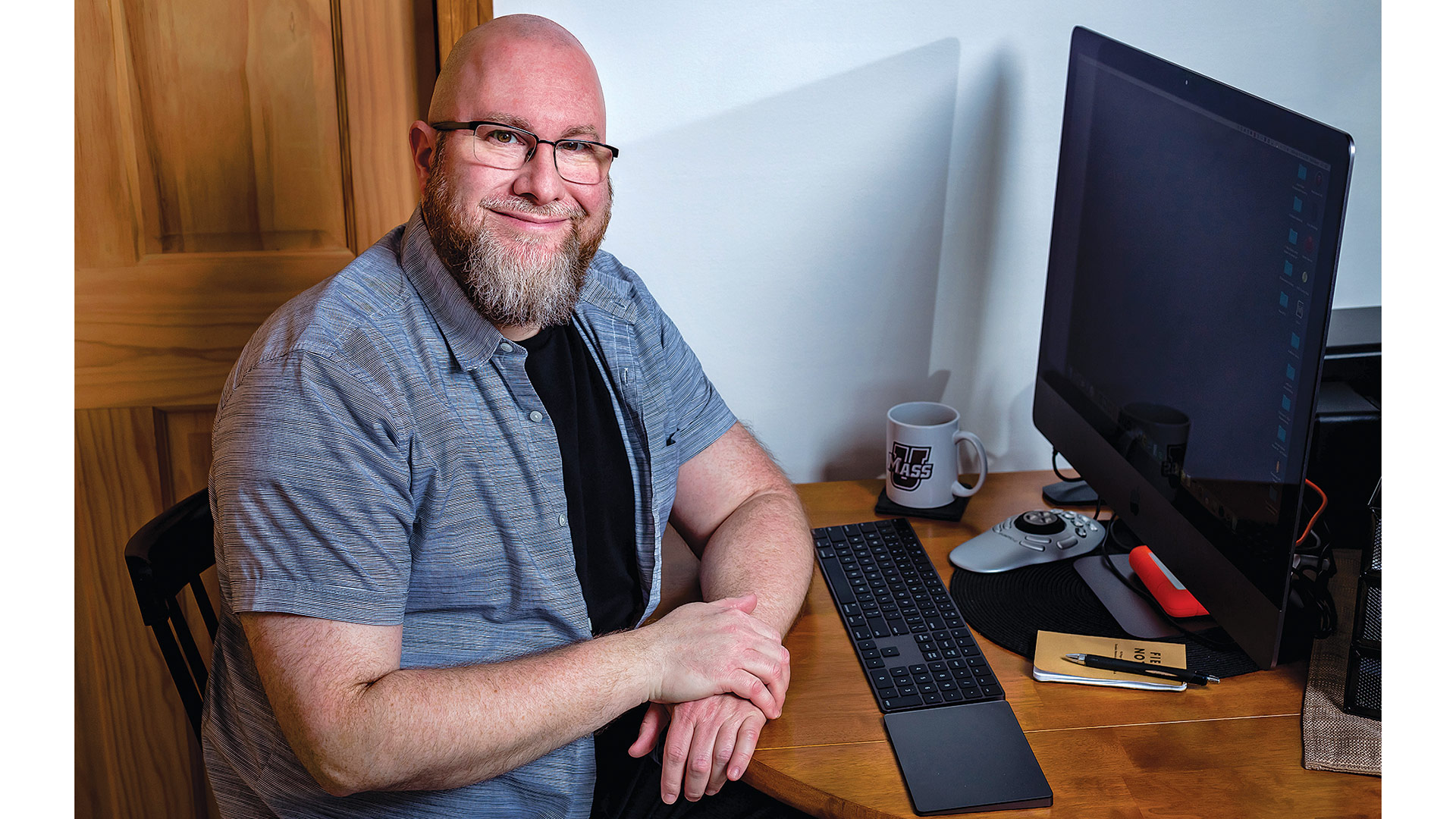
Remote Workers Face Plenty of Challenges
On the Home Front

On one hand, it’s good to be working — many people during the COVID-19 crisis have lost their jobs. However, those who continue to clock in every day, only from home, often face challenges they never had to contend with before, from balancing work with their kids’ education to the anxiety and loneliness that can accompany a lack of face-to-face contact. But that’s today’s new normal, and no one can predict for sure when people might start heading back to the office.
As the office manager at Architecture EL in East Longmeadow, Allison Lapierre-Houle has plenty to do, but enough time to do it. Usually.
“I handle all the administrative tasks — anything HR-related, financial-related, pretty much everything outside what the architects do,” she said, adding that she’s never had to work outside her set hours — until recently.
“Now, I’ve been working on weekends a little bit, at night a little bit, because I have to take constant breaks in between for homeschooling, and all of the distractions that come with running a house and doing my job at the same time.”
Like so many others right now, Lapierre-Houle is still doing that job, only she’s doing it from home — as a single mother of a first-grader and a third-grader, ages 6 and 9.
While the school provides a remote learning plan that students are expected to follow, and daily assignments to complete every day using Chromebooks and Google software — as well as Zoom meetings with classmates — children that young aren’t exactly self-directed, she noted.
“If they were in high school, it would be completely different. In first grade, she literally just learned to read, and now she’s expected to go on the Chromebook and complete assignments. So I do lot of side-by-side work with the kids, while also trying to manage the eight employees for the company, who are all working remotely as well. That’s been the biggest challenge.”

It’s challenging for Allison Lapierre-Houle to balance working at home with two young kids — but at least they can help take a photo for BusinessWest.
David Griffin Jr., vice president of the Dowd Insurance Agencies in Holyoke, is able to split the child-tending duties with his wife, who works for Travelers in Hartford. They’re both home these days, juggling their jobs and home responsibilities as parents of two young ones, ages 2 and 3.
“We’re making the most of it,” Griffin said. “She has a more set schedule than me. Obviously, I have clients calling me, and I can’t plan when the client calls me with questions I have to go through. I get as much done as I can in the morning and late at night, and answer calls and help customers throughout the day. Right now is their greatest time of need, so I have to make myself available and be there for them to lend an ear and give some advice.”
Jim Martin knows that feeling — of working from home at a time when customers have more pressing needs than perhaps ever before. As a partner at Robinson Donovan specializing in corporate law and commercial real estate, he’s been working with clients on their submissions for the Paycheck Protection Program, deciphering the regulations and grappling with an ongoing series of often-confounding changes to them. “My clients need straightforward legal advice on what needs to be included,” he told BusinessWest.
“I do lot of side-by-side work with the kids, while also trying to manage the eight employees for the company, who are all working remotely as well. That’s been the biggest challenge.”
He’s providing that advice — and much more — largely from home, as the firm’s Springfield office is maintaining the core minimum of personnel needed to connect everyone else during a trying time.
“We were well-prepared for this; we had anticipated this may be necessary, so we had a network in place that allowed people to remotely access their desktops from home,” he explained. We got everyone equipped, so when someone comes in with mail, it’s scanned and distributed to every lawyer and the support staff. And we have remote dictation, so I can dictate right to my adminstrative assistant from home. We feel we were pretty well-prepared to make the transition to working remotely.”
 While Martin doesn’t have children at home, he empathizes with those who do, as day cares are closed and people generally can’t come by to babysit.
While Martin doesn’t have children at home, he empathizes with those who do, as day cares are closed and people generally can’t come by to babysit.
He does, however, sometimes have to vie for the landline with his wife, a clinical doctor of psychology who continues to see patients, who are dealing with all sorts of issues, from depression to anxiety to domestic violence, all of which can be exacerbated by the current health and economic crises.
“People who need therapy, they need it more now,” he said. “She fortunately has access to certified confidential means of communication, video communication and things, but sometimes it’s over the phone if folks don’t have technology. So, I’m in one room, she’s in another, and sometimes it’s stressful in the house.”
Workers from most sectors are dealing with the same situation — doing their part to keep their companies afloat while often keeping a household together. But they’re recognizing something else as well — a general patience and understanding among those they deal with, and a recognition that we’re all in this together, even as people grow more anxious to get back to their old routines.
Alone Time
Before COVID-19, Seth Kaye, a Chicopee-based photographer, would get up each morning and go to his office to work and have meetings with clients.
“For me, that’s the biggest difference right now, just not being around people at all,” he said. “I would routinely have coffee breaks or lunch with friends and colleagues; that’s how meetings would be done, face to face. Right now, everything’s over Zoom, which has been fantastic, but nothing face to face.”

Seth Kaye is among many professionals who miss face-to-face interaction with clients.
He brought his entire workstation home, so he’s able to stay in contact with clients and even book new work.
“In terms of contracts, there’s nothing for me to photograph right now, as the commercial events have all been canceled for the foreseeable future. Weddings are the lion’s share of what I do, and people are postponing those to later this year or 2021. But business is still going on. People are still getting engaged. I’m still booking new couples to 2021. The world hasn’t stopped, and people are still planning for the future. That gives me an enormous amount of optimism.”
And also a chance to pivot to other business needs, Kaye added. “I’m trying to take the to work on my marketing and work on personal projects and try new things.”
Griffin said the team at Dowd is pivoting in other ways. “We have five offices and 47 employees, and we’ve been able to get everyone up and running from home; we’re still at full capacity. Of course, the insurance industry is considered an essential business.
“Everyone wants to make this work, but it’s been tricky to say the least,” he added, noting that technology has been a huge help. Because the company uses an internet-based telephone system, everyone was able to take their phones home and plug them into their computers.
“Our receptionist is working from home, and she answers live and transfers the calls,” he said. “And most of the staff have two computer screens in the office, and they brought one of the screens home. So it’s funny — if you go into the office and see all the desks with nothing on them, it looks like we’ve been robbed, but that’s not the case.”
Lawyers are as busy as insurance agents these days, and Martin is a good example, whether it’s helping small businesses with federal stimulus programs or assisting companies scrambling to prepare for all contingencies during the pandemic.
“I spent some time over the last two weeks dealing with transfer ownership issues between shareholders and and/or partners, so if people own a company, either shares or in a partnership, they are now feeling it’s important to establish and confirm in writing how the shares will be transferred … and what the conditions are,” he explained.
Meanwhile, employment laywers are dealing with unemployment and leave issues, while real-estate attorneys grapple with pending projects held up by wholesale postponements of meetings with planning and zoning officials, and estate planners see an uptick in business from families getting their affairs in order (see story on page 24).
The list goes on — and most of the work is being done remotely.
“It is a challenge, if you haven’t worked from home before,” Martin said. “I know some people work from home regularly, but for those of us who haven’t, it’s a big adjustment period. At least it is for me.”
It certainly has been for Lapierre-Houle, and also her kids.
“I definitely find myself, especially in the evening, saying to them, ‘it’s a school night,’” she said. “For them, it doesn’t feel like a school night. They think they can get up whenever they want and stay up as late as they want, but I’m trying to keep us on schedule — they get up like for school, and I sign on to work at 8.”
Convincing students to treat these days like regular school days is undoubtedly something parents of older kids grapple with as well. And kids of all ages are likely tiring of the social isolation.
“They can’t see their friends except behind a computer screen … that’s a significant emotional challenge because they don’t understand the social aspect. But they still have to learn and do their schoolwork,” Lapierre-Houle noted, adding that the warmer weather gives a reprieve in that they can go outside — but also provides an additional distraction because they want to be outside, rather than inside doing schoolwork.
She does appreciate her boss, company president Kevin Rothschild-Shea, who, she says, has always emphasized work-life balance, which has made this transition a little easier for employees. “He’s always been very flexible with families or children, but there’s still pressure to get work done, not to mention all the distractions at home.”
New Routine
Clients have been equally understanding of the current situation, Griffin said. “They’re not giving us a hard time — ‘I need this in two hours.’ Again, turnaround times are out the window, and people have been very accommodating and very understanding of that.”
On a personal level, he does miss meeting clients in person. “There’s nothing like going out and seeing clients face to face and talking with them, trying to see what their energy level is, how business is going … I do miss that. I’ll be excited to get that aspect of things back because it is missed. Now we have to make do with what we have, and everyone is in the same boat together — it’s not like we’re at a competitive disadvantage because of it.”
“It’s funny — if you go into the office and see all the desks with nothing on them, it looks like we’ve been robbed, but that’s not the case.”
Kaye told BusinessWest that’s been a challenge for him as well.
“I would see people regularly, just in passing or at the coffee shop — the day-to-day stuff we take for granted, now that we’re not able to have that routine. The routine now is different,” he said. “Hopefully, it’s a temporary new normal, but that human contact is gone right now.
“I’m taking the quarantine thing seriously, aside from pharmacy drives and having people put food into the trunk of my car when I order it from local farms,” he added. “I haven’t had any face-to-face contact in about three weeks. Some of my friends are doing the same. Some of our parents are not, which is interesting. But the social aspect being gone is definitely challenging.”
As the virus has still not peaked, the next couple weeks will bring more of the same, and though people he talks to are starting to go a bit stir crazy, they’re adapting as best they can, Kaye said.
“The people I’ve been speaking with, whether it’s clients not sure what their plans are going to be for 2020 or talking about postponements, they’ve been really nice about it. They have their needs as business owners, and I have my needs and concerns, and so far everyone has been really great.”
That first coffee-shop meeting will still be pretty satisfying, though — whenever that might be.
Joseph Bednar can be reached at [email protected]




